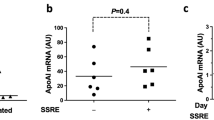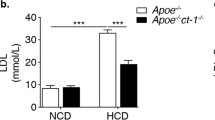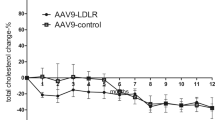Abstract
Elevation of HDL cholesterol, following adenoviral apolipoprotein A-I (apo A-I) gene transfer, may delay or revert ischemic cardiovascular disease, provided transgene expression is persistent. The choice of promoter may have significant impact on persistence of transgene expression. Human apo A-I expression was compared after adenoviral gene transfer with a cytomegalovirus promoter (CMV) driven construct (AdCMV/A-I.gA-I) and with a construct (AdA-I.gA-I.4xapoE) containing the endogenous 256 bp apo A-I promoter (A-I), the genomic human apo A-I DNA (gA-I) and 4 human apo E enhancers (4xapoE) in three different mouse strains: C57BL/6, Balb/c and Fvb. After gene transfer with 5 × 108 p.f.u. of AdCMV/A-I.gA-I, human apo A-I expression was observed for 35 days in C57BL/6 mice, but declined below 1 mg/dl within 14 days both in Balb/c and Fvb mice, due to a strong humoral immune response against human apo A-I. In contrast, after transfer with AdA-I.gA-I.4xapoE, human apo A-I expression persisted for 6 months in all three strains and no antibodies against human apo A-I occurred in Fvb or Balb/c mice. Human apo A-I transgene DNA level 35 days after transfer with AdA-I.gA-I.4xapoE was 4.6- to 5.5-fold higher than with AdCMV/A-I.gA-I. CMV promoter attenuation occurred in all three strains, but promoter attenuation was not observed in any strain after transfer with AdA-I.gA-I.4xapoE. In conclusion, gene transfer with AdA-I.gA-I.4xapoE is associated with absence of an immune response against human apo A-I, improved transgene DNA persistence and absence of promoter shut-off, resulting in human apo A-I expression for up to 6 months in three different mouse strains. Possibly, the absence of human apo A-I expression in antigen-presenting cells with the liver-specific apo A-I promoter containing construct abrogated the immune response against human apo A-I in Balb/c and Fvb mice.
This is a preview of subscription content, access via your institution
Access options
Subscribe to this journal
Receive 12 print issues and online access
$259.00 per year
only $21.58 per issue
Buy this article
- Purchase on Springer Link
- Instant access to full article PDF
Prices may be subject to local taxes which are calculated during checkout


Similar content being viewed by others
References
Manninen V et al. High-density lipoprotein cholesterol and cardiovascular disease. Four prospective American studies J Am Med Assoc 1988 260: 641–651
Paszty C, Maeda N, Verstuyft J, Rubin EM . Apolipoprotein AI transgene corrects apolipoprotein E deficiency-induced atherosclerosis in mice J Clin Invest 1994 94: 899–903
Plump AS, Scott CJ, Breslow JL . Human apolipoprotein A-I gene expression increases high density lipoprotein and suppresses atherosclerosis in the apolipoprotein E-deficient mouse Proc Natl Acad Sci USA 1994 91: 9607–9611
De Geest B, Zhao Z, Collen D, Holvoet P . Effects of adenovirus-mediated human apo A-I gene transfer on neointima formation after endothelial denudation in apo E-deficient mice Circulation 1997 96: 4349–4356
Tangirala RK et al. Regression of atherosclerosis induced by liver-directed gene transfer of apolipoprotein A-I in mice Circulation 1999 100: 1816–1822
De Geest B et al. Sustained expression of human apolipoprotein A-I following adenoviral gene transfer in C57BL/6 mice. Role of apo A-I promoter, apo A-I introns and human apo E enhancer Hum Gene Ther 2000 11: 101–112
Connelly S et al. Sustained expression of therapeutic levels of human factor VIII in mice Blood 1996 87: 4671–4677
Michou AI et al. Adenovirus-mediated gene transfer: influence of transgene, mouse strain and type of immune response on persistence of transgene expression Gene Therapy 1997 4: 473–482
Barr D et al. Strain related variations in adenovirally mediated transgene expression from mousehepatocytes in vivo: comparisons between immunocompetent and immunodeficient inbred strains Gene Therapy 1995 2: 151–155
Morral N et al. Immune responses to reporter proteins and high viral dose limit duration of expression with adenoviral vectors: comparison of E2a wild type and E2a deleted vectors Hum Gene Ther 1997 8: 1275–1286
Jooss K, Yang Y, Fisher KJ, Wilson JM . Transduction of dendritic cells by DNA viral vectors directs the immune response to transgene products in muscle fibers J Virol 1998 72: 4212–4223
Pastore L et al. Use of a liver-specific promoter reduces immune response to the transgene in adenoviral vectors Hum Gene Ther 1999 10: 1773–1781
Long EO . Antigen processing for presentation to CD4+ T cells New Biol 1992 4: 274–282
Worgall S, Wolff G, Falck-Pedersen E, Crystal RG . Innate immune mechanisms dominate elimination of adenoviral vectors following in vivo administration Hum Gene Ther 1997 8: 37–44
O'Neal WK et al. Toxicological comparison of E2a-deleted and first-generation adenoviral vectors expressing alphal-antitrypsin after systemic delivery Hum Gene Ther 1998 9: 1587–1598
Mittereder N, March KL, Trapnell BC . Evaluation of the concentration and bioactivity of adenovectors for gene therapy J Virol 1996 70: 7498–7509
Acknowledgements
Bart De Geest is a Postdoctoral Fellow of the Fonds voor Wetenschappelijk Onderzoek-Vlaanderen. Sophie Van Linthout is a Research Assistant of the Instituut voor Wetenschappelijk en Technisch Onderzoek-Vlaanderen. We thank Z Zhang for excellent technical assistance.
Author information
Authors and Affiliations
Rights and permissions
About this article
Cite this article
De Geest, B., Van Linthout, S. & Collen, D. Sustained expression of human apo A-I following adenoviral gene transfer in mice. Gene Ther 8, 121–127 (2001). https://doi.org/10.1038/sj.gt.3301374
Received:
Accepted:
Published:
Issue Date:
DOI: https://doi.org/10.1038/sj.gt.3301374
Keywords
This article is cited by
-
Apolipoprotein A-I gene transfer exerts immunomodulatory effects and reduces vascular inflammation and fibrosis in ob/ob mice
Journal of Inflammation (2016)
-
PEGylated helper-dependent adenoviral vector expressing human Apo A-I for gene therapy in LDLR-deficient mice
Gene Therapy (2013)
-
BALB/c Mice Show Impaired Hepatic Tolerogenic Response Following AAV Gene Transfer to the Liver
Molecular Therapy (2010)
-
The impact of antigen expression in antigen-presenting cells on humoral immune responses against the transgene product
Gene Therapy (2010)
-
Apolipoprotein A-I and lecithin:cholesterol acyltransferase transfer induce cholesterol unloading in complex atherosclerotic lesions
Gene Therapy (2009)



